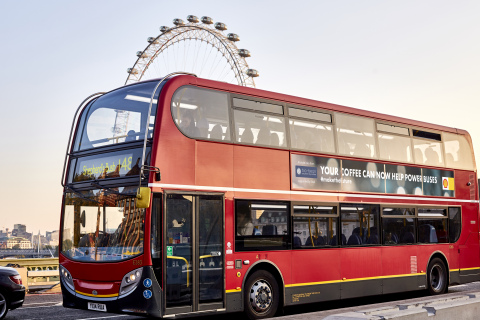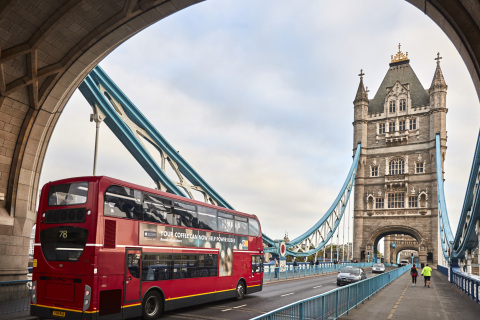LONDON--(BUSINESS WIRE)--Shell and bio-bean announce that together they are helping to power some of London’s buses using a biofuel made partly from waste coffee grounds.
The B20 biofuel contains a 20% bio-component which contains part coffee oil. The biofuel is being added to the London bus fuel supply chain and will help to power some of the buses; without need for modification.
Biofuel provides a cleaner, more sustainable energy solution for buses across London’s network by decreasing emissions1.
“Our Coffee Logs have already become the fuel of choice for households looking for a high-performance, sustainable way to heat their homes – and now, with the support of Shell, bio-bean and Argent Energy have created thousands of litres of coffee-derived B20 biodiesel which will help power London buses for the first time.” said bio-bean’s founder Arthur Kay. “It’s a great example of what can be done when we start to reimagine waste as an untapped resource.”
The average Londoner drinks 2.3 cups of coffee a day2 which produces over 200,000 tonnes3 of waste a year, much of which would otherwise end in landfill with the potential to emit 126million kg of CO24. bio-bean works to collect some of these waste coffee grounds from high street chains and factories.
The grounds are dried and processed before coffee oil is extracted. bio-bean works with its fuel partner Argent Energy to process this oil into a blended B20 biofuel. 6,000 litres of coffee oil has been produced, which if used as a pure-blend for the bio component and mixed with mineral diesel to form a B20, could help power the equivalent of one London bus for a year5.
This latest collaboration is part of Shell’s #makethefuture energy relay, which supports entrepreneurs turning bright energy innovations into a positive impact for communities around the world.
Sinead Lynch, Shell UK Country Chair, said: “When it comes to clean energy, we are always looking for the next inventive solution. A good idea can come from anywhere, but with the scale and commitment of Shell, we can help enable true progress. We're pleased to be able to support bio-bean to trial this innovative new energy solution which can help to power buses, keeping Londoners moving around the city - powered in part by their waste coffee grounds.”
bio-bean founder Arthur Kay won Shell LiveWIRE’s Innovation Award in 2013 and the Mayor’s Entrepreneur Programme in 2012 with his ideas about turning coffee waste into fuel. bio-bean has since gone on to produce bio-mass pellets and briquettes called Coffee Logs, before this latest biofuel innovation.
-Ends-
1 TFL.gov.uk
2 Tassimo
3 bio-bean source information
4 https://www.gov.uk/government/publications/greenhouse-gas-reporting-conversion-factors-2017 (calculation 627kg of CO2 per 1000kg of WCG, bio-bean removes 200,000 tonnes)
5 Calculation based on biofuel consumption and bus circulation numbers detailed quoted by TFL.gov.uk.









